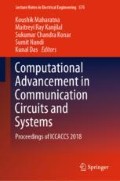Abstract
Optimal reactive power dispatch (ORPD) is the most functional part of reactive power dispatch technique, by which an effective solution of power flow can be befitted and the system parameters can be arranged in such a value, so that network power losses could be minimized. The ORPD problem can be solved as a single-objective as well as multi-objective optimization problem with the help of various conventional techniques as well as modern developed techniques like differential evolution, particle swarm optimization, genetic algorithm, Jaya algorithm, etc. This paper is an attempt to minimize transmission line power losses by introducing solar energy sources in addition to the existing conventional sources to power network system along with adjusting the reactive power controlled parameter without violating technical equality constraints and inequality constraints. The proposed designed model has been analyzed for IEEE 14-bus and IEEE 30-bus test systems by using Jaya algorithm. The simulation result with comparing others’ existing result with and without the inclusion of solar energy has shown that the proposed designed model is effective and profitable for planning an interconnected reliable power system network.
Access this chapter
Tax calculation will be finalised at checkout
Purchases are for personal use only
References
W. Nakawiro, I. Erlich, J.L. Rueda, A novel optimization algorithm for optimal reactive power dispatch: a comparative study, in 4th International Conference on Electric Utility Deregulation and Restructuring and Power Technologies (DRPT) (2011)
K. Abaci, V. Yamaçli, Optimal reactive-power dispatch using differential search algorithm. Electr. Eng. 99, 213–225 (2017)
M. Ghasemi, S. Ghavidel, M.M. Ghanbarian, A. Habibia, A new hybrid algorithm for optimal reactive power dispatch problem with discrete and continuous control variables. Appl. Soft Comput. 22, 126–140 (2014)
S. Pandya, R. Roy, Particle swarm optimization based optimal reactive power dispatch, in IEEE International Conference on Electrical, Computer and Communication Technologies (ICECCT) (2015)
P.P. Biswas, P.N. Suganthan, G.A.J. Amaratunga, Optimal power flow solutions incorporating stochastic wind and solar power. Energy Convers. Manage. 148, 1194–1207 (2017)
M. Mehdinejad, B. Mohammadi-Ivatloo, R. Dadashzadeh-Bonab, K. Zare, Solution of optimal reactive power dispatch of power systems using hybrid particle swarm optimization and imperialist competitive algorithms. Electr. Power Energy Syst. 83, 104–116 (2016)
W. Zhou, H. Yang, Z. Fang, A novel model for photovoltaic array performance prediction. Appl. Energy 84, 1187–1198 (2007)
P. Kayal, C.K. Chanda, Placement of wind and solar based DGs in distribution system for power loss minimization and voltage stability improvement. Electr. Power Energy Syst. 53, 795–809 (2013)
R. Venkata Rao, Jaya: a simple and new optimization algorithm for solving constrained and unconstrained optimization problems. Int. J. Ind. Eng. Computations 7, 19–34 (2016)
T. Das, R. Roy, Optimal reactive power dispatch using JAYA algorithm, in IEEE International Conference on Emerging Trends in Electronic Devices and Computational Techniques (EDCT) (2018)
P. Subbaraj, P.N. Rajnarayanan, Optimal reactive power dispatch using self-adaptive real coded genetic algorithm. Electr. Power Syst. Res. 79, 374–381 (2009)
Washington University. https://www2.ee.washington.edu/research/pstca/
Y. Li, Y. Wang, B. Li, A hybrid artificial bee colony assisted differential evolution algorithm for optimal reactive power flow. Electr. Power Energy Syst. 52, 25–33 (2013)
Author information
Authors and Affiliations
Corresponding author
Editor information
Editors and Affiliations
Rights and permissions
Copyright information
© 2020 Springer Nature Singapore Pte Ltd.
About this paper
Cite this paper
Das, T. et al. (2020). Optimal Reactive Power Dispatch Incorporating Solar Power Using Jaya Algorithm. In: Maharatna, K., Kanjilal, M., Konar, S., Nandi, S., Das, K. (eds) Computational Advancement in Communication Circuits and Systems. Lecture Notes in Electrical Engineering, vol 575. Springer, Singapore. https://doi.org/10.1007/978-981-13-8687-9_4
Download citation
DOI: https://doi.org/10.1007/978-981-13-8687-9_4
Published:
Publisher Name: Springer, Singapore
Print ISBN: 978-981-13-8686-2
Online ISBN: 978-981-13-8687-9
eBook Packages: EngineeringEngineering (R0)

